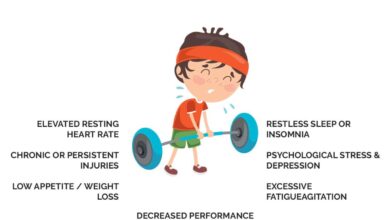
8 Bad Habits Ruining Sleep: How to Get a Better Nights Rest
8 Bad Habits Ruining Sleep: We all know that a good night’s sleep is essential for our physical and mental health. But did you know that there are a number of common habits that can be sabotaging your sleep? From late-night screen time to heavy meals before bed, these seemingly harmless activities can have a significant impact on your sleep quality.
This article will explore eight common habits that can interfere with your sleep and provide practical tips for breaking them. By making a few simple changes to your routine, you can improve your sleep quality and wake up feeling refreshed and energized.
Late-Night Screen Time
Our modern world is filled with screens, and the temptation to scroll through social media, watch videos, or work on our laptops late into the night can be hard to resist. However, late-night screen time can significantly disrupt our sleep patterns, leading to a cascade of negative consequences for our physical and mental well-being.
The Impact of Blue Light
Blue light, emitted from electronic devices, is particularly disruptive to our sleep cycles. Our bodies naturally produce melatonin, a hormone that regulates sleep, in response to darkness. Blue light, however, can suppress melatonin production, making it harder to fall asleep and stay asleep.
Studies have shown that exposure to blue light before bed can delay the onset of sleep by up to an hour, disrupt the natural sleep-wake cycle, and reduce the quality of sleep.
Stimulating Content
Beyond the impact of blue light, the stimulating nature of digital content itself can interfere with relaxation and sleep onset. The constant stream of information, notifications, and entertainment can keep our brains in an active state, making it difficult to unwind and transition into a restful state.
Establishing a Digital Curfew
To mitigate the negative effects of late-night screen time, it’s essential to establish a “digital curfew”a time after which you avoid all screen use. A digital curfew allows your body to naturally produce melatonin, leading to better sleep quality.
Creating a Relaxing Bedtime Routine
A relaxing bedtime routine is crucial for preparing your body and mind for sleep. This could include taking a warm bath, reading a book, listening to calming music, or practicing meditation or deep breathing exercises. These activities signal to your brain that it’s time to wind down and prepare for sleep.
Caffeine Consumption

Caffeine is a stimulant that can interfere with your sleep cycle, making it harder to fall asleep and stay asleep. It works by blocking adenosine, a neurotransmitter that promotes sleepiness.
Caffeine’s Effects on the Central Nervous System and Sleep
Caffeine stimulates the central nervous system, leading to increased alertness, focus, and energy levels. It also blocks adenosine, a neurotransmitter that promotes sleepiness. This can lead to difficulty falling asleep, lighter sleep, and shorter sleep duration.
Limiting Caffeine Intake Before Bedtime
To minimize caffeine’s impact on your sleep, it’s crucial to limit your intake in the hours leading up to bedtime. The half-life of caffeine is around 5 hours, meaning it takes about 5 hours for your body to eliminate half of the caffeine you’ve consumed.
We all know those late-night scrolling sessions, the caffeine binges before bed, and the lack of consistent sleep schedules are bad for our sleep. But did you know these are just a few of the 8 bad habits ruining our sleep?
Tracking your sleep patterns, like how long you sleep and your sleep quality, can reveal a lot about your sleep hygiene. You can use this data to identify patterns and make changes, and that’s where the power of data tracking comes in.
Check out this great article on 3 ways to use tracked data to meet your goals , and you’ll see how it can be applied to improve your sleep! Once you identify the bad habits that are disrupting your sleep, you can start tackling them head-on, one step at a time.
Recommendations for Limiting Caffeine Intake
- Avoid caffeine after noon. This allows your body ample time to process the caffeine before bedtime.
- Opt for decaffeinated beverages or water in the evening.
- Be mindful of hidden sources of caffeine, such as chocolate, energy drinks, and some medications.
Caffeine Withdrawal Symptoms and Their Influence on Sleep
Abruptly stopping caffeine consumption can lead to withdrawal symptoms, including headaches, fatigue, and difficulty concentrating. These symptoms can negatively impact sleep quality and duration, making it even harder to fall asleep and stay asleep.
Strategies for Managing Caffeine Withdrawal Symptoms
- Gradually reduce your caffeine intake over several days to minimize withdrawal symptoms.
- Stay hydrated by drinking plenty of water throughout the day.
- Engage in regular physical activity to help manage fatigue and improve sleep quality.
Alcohol Consumption
While an evening drink might seem like a relaxing way to unwind, alcohol can significantly impact your sleep quality, even if it initially induces drowsiness. This is because alcohol disrupts your sleep cycles, leading to a less restful night’s sleep.
Effects of Alcohol on Sleep
Alcohol’s initial sedative effects can make you feel sleepy and fall asleep faster. However, this effect is short-lived, and as the alcohol metabolizes, it can disrupt your sleep later in the night. Alcohol interferes with REM sleep, the stage of sleep associated with dreaming and memory consolidation.
This can lead to fragmented sleep, lighter sleep, and an increased likelihood of waking up during the night. Alcohol can also contribute to sleep disturbances like nightmares and sleepwalking. If you regularly consume alcohol before bed, you may experience difficulty falling asleep, frequent awakenings, and a reduced overall sleep duration.
This can lead to daytime fatigue, impaired cognitive function, and increased risk of accidents.
Guidelines for Responsible Alcohol Consumption
To minimize the negative effects of alcohol on your sleep, it’s essential to consume alcohol responsibly and in moderation. The National Institute on Alcohol Abuse and Alcoholism (NIAAA) defines moderate alcohol consumption as:
- For men, up to two drinks per day.
- For women, up to one drink per day.
A “drink” is defined as:
- 12 ounces of regular beer
- 5 ounces of wine
- 1.5 ounces of distilled spirits
It’s crucial to avoid alcohol consumption close to bedtime. Allowing your body ample time to metabolize the alcohol before sleep can help minimize its disruptive effects. If you’re concerned about the impact of alcohol on your sleep, it’s best to consult with a healthcare professional for personalized advice.
Irregular Sleep Schedules: 8 Bad Habits Ruining Sleep
Imagine a well-oiled machine, running smoothly and efficiently. That’s what a consistent sleep schedule does for your body. It allows your internal clock, known as the circadian rhythm, to work harmoniously, promoting optimal sleep and overall well-being. But when you disrupt this natural rhythm by going to bed and waking up at different times, it’s like throwing a wrench into the machinery, leading to a cascade of negative effects.
Impact of Irregular Sleep Schedules on Circadian Rhythm
The circadian rhythm is a natural, internal process that regulates the sleep-wake cycle and influences various bodily functions, including hormone production, body temperature, and alertness. It’s like a 24-hour internal clock that synchronizes with the Earth’s rotation. When you deviate from a consistent sleep schedule, especially on weekends, you disrupt this delicate balance, leading to:* Difficulty falling asleep and waking up: Your body becomes confused, struggling to adapt to the sudden changes, making it harder to fall asleep at your desired time.
Reduced sleep quality
The fragmented sleep patterns associated with irregular sleep schedules can lead to lighter sleep, fewer REM cycles, and overall poorer sleep quality.
Hormonal imbalances
Irregular sleep schedules can disrupt the production of key hormones like melatonin, cortisol, and growth hormone, which are crucial for regulating sleep, mood, and energy levels.
Increased risk of health problems
Long-term disruption of the circadian rhythm can increase the risk of chronic conditions such as obesity, diabetes, heart disease, and depression.
Establishing a Regular Sleep Routine
Creating a regular sleep routine is essential for resetting your circadian rhythm and promoting consistent sleep. Here are some tips to help you establish a healthy sleep pattern:* Go to bed and wake up at the same time every day: This includes weekends. Maintaining consistency helps to regulate your body’s natural sleep-wake cycle.
Create a relaxing bedtime routine
You know how they say a good night’s sleep is the foundation for a healthy life? Well, it’s true! But all those late-night scrolling sessions and pre-bed caffeine hits can really throw a wrench in your sleep schedule. Speaking of schedules, I’m getting excited for Thanksgiving! I’m planning to make my table a real feast for the eyes, with colorful centerpieces and vibrant dishes.
If you’re looking for some inspiration, check out this article on 5 ways to fill your thanksgiving table with color. After all, a good night’s sleep is essential for enjoying all those delicious Thanksgiving treats!
Engage in calming activities like taking a warm bath, reading a book, or listening to soothing music to signal to your body that it’s time to wind down.
Avoid screen time before bed
The blue light emitted from electronic devices can interfere with melatonin production, making it harder to fall asleep.
Limit caffeine and alcohol consumption
Caffeine is a stimulant that can keep you awake, while alcohol can disrupt sleep later in the night.
Make sure your bedroom is dark, quiet, and cool
A comfortable sleep environment can significantly improve sleep quality.
Get regular exercise
Physical activity can improve sleep quality, but avoid exercising too close to bedtime.
Expose yourself to sunlight during the day
This helps to regulate your circadian rhythm and promotes better sleep at night.
Napping Habits
Napping can be a double-edged sword when it comes to sleep. While a well-timed nap can boost alertness and improve performance, a poorly planned nap can disrupt your nighttime sleep and leave you feeling groggy. Understanding the potential benefits and drawbacks of napping, as well as how to practice it effectively, is key to reaping its advantages without compromising your sleep quality.
You know how they say, “you are what you eat?” Well, I’d argue that good sleep is what you do too. Along with ditching those late-night screen habits, I’ve been trying to get more exercise. I’ve found some great 10, 20, and 30-minute walking workouts that I can easily fit into my day.
It’s amazing how even a short walk can help me wind down before bed and get those zzz’s! So, if you’re struggling with sleep, consider adding a brisk walk to your routine – you might be surprised at the difference it makes.
The Potential Benefits of Napping
Napping can offer a range of benefits, particularly when done strategically.
- Improved Alertness and Cognitive Function:A short nap can significantly enhance alertness, focus, and cognitive performance. Studies have shown that naps can improve reaction time, memory, and problem-solving abilities. For example, a 20-minute nap can be as effective as a cup of coffee in improving alertness.
- Reduced Fatigue and Stress:Naps can help reduce fatigue and stress levels, making you feel more refreshed and energized. They can also improve mood and emotional regulation.
- Enhanced Learning and Memory:Napping can consolidate memories and improve learning. Research suggests that naps can help transfer information from short-term to long-term memory.
- Improved Physical Performance:Naps can enhance physical performance by reducing muscle fatigue and improving recovery time. Athletes often use naps as a strategy to optimize their training and performance.
The Potential Drawbacks of Napping
While naps can offer numerous benefits, they can also have negative consequences if not practiced strategically.
- Disrupted Nighttime Sleep:Napping too late in the day or for too long can disrupt your natural sleep-wake cycle and make it harder to fall asleep at night.
- Sleep Inertia:A long nap can leave you feeling groggy and disoriented upon waking, a phenomenon known as sleep inertia. This can make it difficult to return to your daily activities.
- Increased Risk of Sleep Disorders:For individuals with pre-existing sleep disorders, such as insomnia or sleep apnea, napping can worsen their symptoms.
Strategic Napping Practices, 8 bad habits ruining sleep
To maximize the benefits of napping while minimizing its potential drawbacks, it’s essential to follow strategic napping practices.
- Timing:The ideal time for a nap is between 1 pm and 3 pm, as this coincides with a natural dip in alertness known as the “post-lunch dip.” Avoid napping too late in the day, as this can disrupt your nighttime sleep.
- Duration:The optimal nap duration is 20-30 minutes. This allows you to enter a light stage of sleep, known as Stage 2 sleep, which is associated with alertness and cognitive benefits, without experiencing sleep inertia.
- Environment:Create a quiet and dark environment for your nap. A cool room temperature and comfortable bedding can also promote relaxation and sleep.
- Regularity:If you choose to nap regularly, try to maintain a consistent schedule. This will help regulate your sleep-wake cycle and make it easier to fall asleep at night.
Heavy Meals Before Bed
Eating a heavy meal close to bedtime can significantly disrupt your sleep. While it might seem tempting to indulge in a large dinner before hitting the sack, it can lead to digestive discomfort and interfere with your sleep quality. Your body works hard to digest food, and this process can interfere with the natural sleep-wake cycle.
The Digestive Process and Its Impact on Sleep
The digestive system works tirelessly throughout the day, breaking down food into nutrients your body can absorb. When you eat a heavy meal before bed, your digestive system remains active, diverting energy away from the processes involved in sleep. This can lead to a feeling of fullness, indigestion, heartburn, and even nausea, making it difficult to fall asleep or stay asleep.
The discomfort caused by an active digestive system can also lead to frequent awakenings throughout the night, disrupting your sleep cycle and leaving you feeling tired and groggy in the morning.
Strategies for Lighter Evening Meals
Instead of heavy meals, consider lighter options that are easier to digest and less likely to interfere with your sleep. Focus on foods rich in protein and complex carbohydrates, which are digested more slowly and provide sustained energy. Avoid sugary foods and processed snacks, as they can cause a spike in blood sugar levels, followed by a crash, disrupting your sleep.
Ending Remarks

While breaking these bad habits might seem challenging, it’s important to remember that even small changes can have a big impact on your sleep. By being mindful of your habits and making conscious efforts to improve your sleep hygiene, you can create a foundation for better sleep and a healthier lifestyle.






